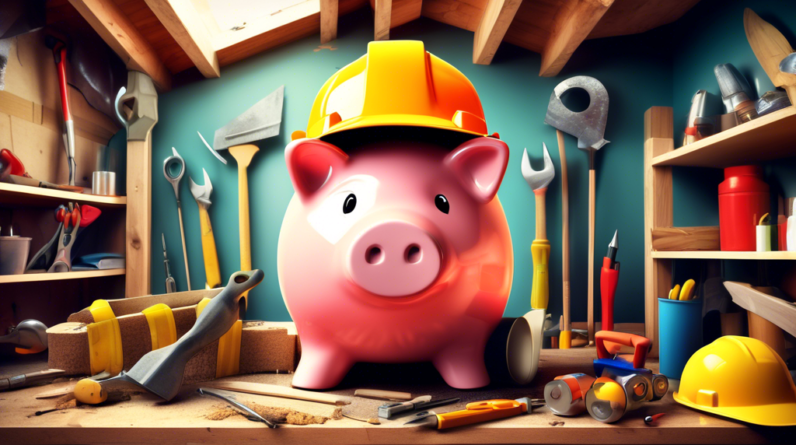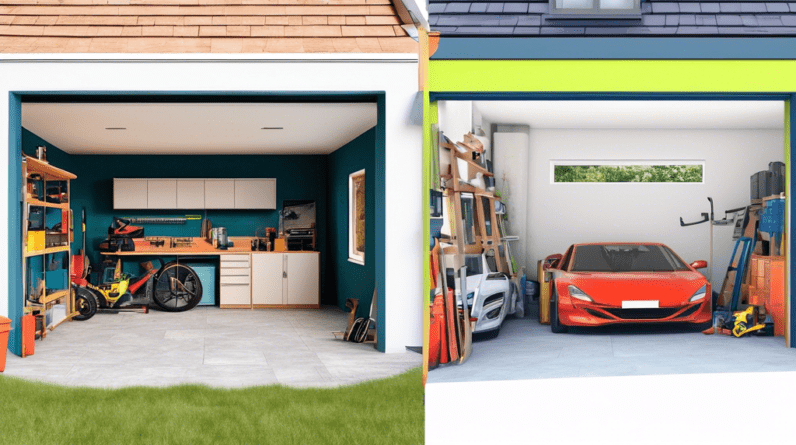
Understanding the Costs of a Garage Conversion
Before diving into financing options, it’s crucial to understand the potential costs associated with your garage conversion. These can vary significantly based on factors like your location, the size and condition of your garage, and the complexity of your desired renovation.
Here’s a breakdown of common cost factors:
- Design Fees: Architectural plans, engineering, permits (5-15% of the total project cost).
- Construction Costs: Framing, insulation, drywall, flooring, electrical, plumbing, HVAC (varies greatly depending on materials and labor).
- Finishes: Flooring, cabinets, countertops, appliances, fixtures (can range from basic to luxurious).
- Contingency Buffer: Always budget for unexpected issues or changes (5-10% of the total cost).
Getting multiple quotes from reputable contractors and creating a detailed budget will give you a realistic picture of your financing needs.
Exploring Your Garage Conversion Financing Options
Once you have a grasp on your budget, you can explore the various financing options available:
1. Cash-Out Refinance
How it Works: You refinance your existing mortgage for a larger amount than you currently owe, taking the difference in cash.
Pros:
- Access to a large lump sum of money.
- Potentially lower interest rates than other financing options.
- Tax-deductible interest (in some cases, consult a tax professional).
Cons:
- You’ll reset your mortgage term and may pay more in interest over the life of the loan.
- Closing costs can be significant.
- Risk of foreclosure if you can’t make the new mortgage payments.
2. Home Equity Loan
How it Works: You borrow against the equity you’ve built in your home, receiving a lump sum of money.
Pros:
- Typically lower interest rates than personal loans or credit cards.
- Fixed interest rates provide predictable payments.
- Possible tax deductions on interest (consult a tax professional).
Cons:
- You’re using your home as collateral, risking foreclosure if you can’t repay the loan.
- May require good credit and significant home equity.
3. Home Equity Line of Credit (HELOC)
How it Works: You’re approved for a line of credit based on your home equity, which you can draw from as needed.
Pros:
- Flexibility to borrow only what you need, when you need it.
- Potentially lower interest rates than other financing options.
- Possible tax deductions on interest (consult a tax professional).
Cons:
- Variable interest rates can fluctuate, making payments unpredictable.
- You’re using your home as collateral, risking foreclosure if you can’t repay the loan.
4. Personal Loan
How it Works: You borrow a fixed amount of money from a lender and repay it over a set term with interest.
Pros:
- No collateral required (usually unsecured).
- Fixed interest rates provide predictable payments.
- Relatively quick and easy application process.
Cons:
- Typically higher interest rates than home equity products.
- May not be suitable for large renovation projects.
5. Credit Cards
How it Works: Charge your renovation expenses to a credit card with available credit.
Pros:
- Convenient for small to medium-sized expenses.
- May earn rewards points or cash back, depending on the card.
Cons:
- High interest rates can quickly accrue debt if not paid off quickly.
- Not ideal for large-scale projects.
- Can negatively impact your credit score if not managed responsibly.
6. Government-Backed Programs
How it Works: Various government programs (e.g., FHA 203(k) loan, Energy Efficient Mortgages) offer financing options for home renovations, potentially with more flexible requirements than traditional loans.
Pros:
- May have lower down payment or credit score requirements.
- Can be used for a variety of renovation projects.
Cons:
- Eligibility criteria and program guidelines can be strict.
- May involve additional paperwork and processing time.
Choosing the Right Financing Option
The best financing option for your garage conversion will depend on your unique financial situation and goals. Here are some key factors to consider:
- Amount of Financing Needed: Cash-out refinances and home equity loans/lines of credit are generally better for larger projects.
- Interest Rates: Compare interest rates and APRs (annual percentage rates) across lenders and loan types.
- Loan Terms: Consider the loan’s repayment period and monthly payments.
- Fees and Closing Costs: Factor in any associated fees to determine the true cost of borrowing.
- Credit Score and History: Your creditworthiness will impact your eligibility and interest rates.
- Home Equity: The amount of equity you have in your home can affect your borrowing options.
Tips for Securing Garage Conversion Financing
To increase your chances of approval and secure favorable terms, keep these tips in mind:
- Check Your Credit Report: Review your credit report for errors and work on improving your credit score if necessary.
- Shop Around for Lenders: Compare rates and terms from multiple lenders to find the best deal.
- Gather Documentation: Be prepared to provide financial documents like income verification, tax returns, and bank statements.
- Consider a Contractor with Financing Options: Some contractors offer in-house financing or have partnerships with lenders.
- Understand the Loan Agreement: Carefully read and understand the terms and conditions of any loan agreement before signing.
Conclusion
A garage conversion can be a valuable investment, adding space, functionality, and value to your home. By carefully considering your financing options and working with qualified professionals, you can turn your garage transformation dreams into a reality.






